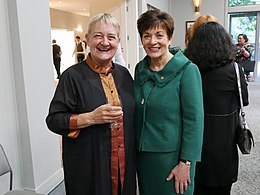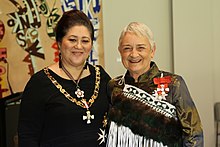Marilyn Waring
She criticises a system which "counts oil spills and wars as contributors to economic growth, while child-rearing and housekeeping are deemed valueless".
Waring has had a long-time involvement with the Association for Women's Rights in Development, a progressive feminist organisation that advocates inclusive feminism, and served on its board until 2012.
Her great-grandfather Harry (Arthur Henry) Waring had emigrated to New Zealand from Hopesay in Herefordshire, England, in 1881, and established the family butchery business at Taupiri.
She joined because she supported National MP Venn Young, who introduced a private member's bill into parliament for homosexual law reform; this was opposed by Norman Kirk, the Labour Party Prime Minister.
[10] She quickly entered the Opposition Research Unit as a part-time advisor under George Gair, the Shadow Minister of Housing.
An overjoyed Holyoake personally arrived within the hour to Parliament House, and offered her the selection without even formally introducing himself.
[13][14] Waring campaigned for selection by making house calls on party delegates, starting in her home town of Huntly, borrowing her mother's car (and some of her clothes).
[15] When her selection was announced Waring thought there had been "a dreadful mistake" but there was a round of stand-up cheering and Jim Bolger from the neighbouring King Country electorate raced up and embraced her on stage.
According to Barry Gustafson, She also served on the Select committee for Violent Offending, taking a particular interest in the Aroha Trust, formed by Black Power women.
It criticises the use of GDP as a surrogate for "progress," and argues that lacking valuation of women and nature drive decisions in globalisation that have unintended but terrible consequences for the world.
According to Julie A. Nelson, A highly influential thinker and practitioner, her work has influenced both academia and United Nations policies.
[30] If Women Counted "persuaded the United Nations to redefine gross domestic product, inspired new accounting methods in dozens of countries and became the founding document of the discipline of feminist economics.
[34] Other notable students of Waring include Sue Bradford, Trish Bradbury, Shirley Jülich and Karanina Sumeo.
[35][36][37][38] She was one of 16 prominent intellectuals invited to contribute to a French publication on human rights around the globe in 2007, along with Ken Loach, Maude Barlow, Walden Bello and Susan George.
[39] In 2014, the anthology Counting on Marilyn Waring: New Advances in Feminist Economics, edited by Margunn Bjørnholt and Ailsa McKay, was published.
According to Choice: Current Reviews for Academic Libraries, the book explores "a wide range of issues—including the fundamental meaning of economic growth and activity to consumption, health care, mortality, unpaid household work, mothering, education, nutrition, equality, and sustainability" and reveals "the breadth, depth, and substance that can grow from innovative ideas and critical analysis.
"[41] According to Wired, Waring has led the Gender and Governance team for the Regional Assistance Mission to Solomon Islands.
[45] She refused to comment at the time[46] and the Prime Minister, Robert Muldoon, moved swiftly to minimise publicity and protect her; the general attitude among politicians being that it was a private matter.
[32][50] Since 1984 and in between her academic and activist engagements, Waring farmed angora goats and dry stock, latterly on her hill-farm north of Auckland.
Her experiences of life on the farm, international questions, New Zealand politics, feminist issues, and women of influence, were recorded In the Lifetime of a Goat: Writings 1984–2000; her popular Listener columns Letters to My Sisters from 1984 to 1989, form the basis.
[63] Waring's work is discussed in Melinda Gates' 2019 book The Moment of Lift: How Empowering Women Changes the World.

